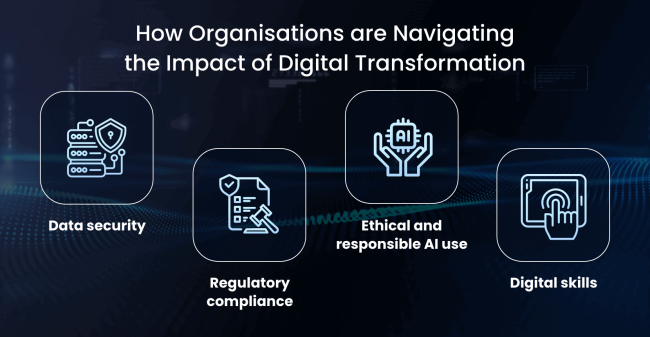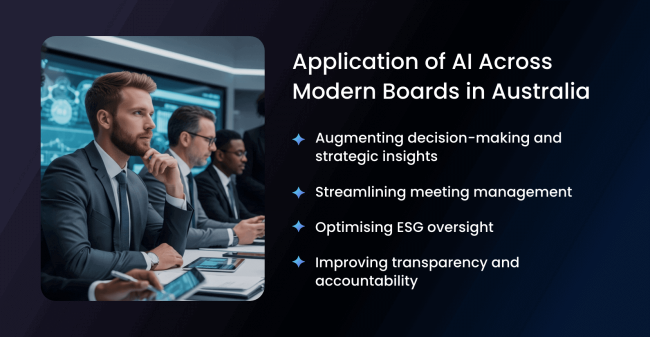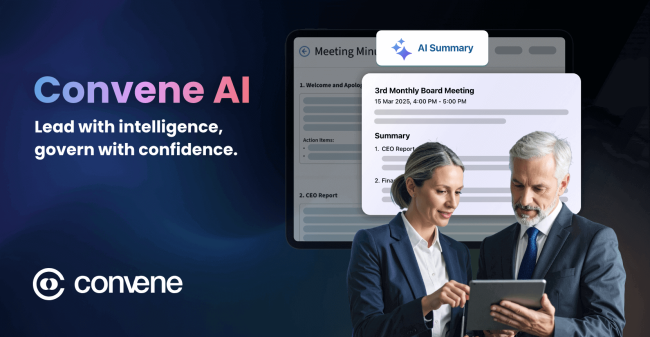Corporate governance in Australia is experiencing significant transformations due to shifting regulatory landscapes, investor expectations, diversity, equity, and inclusion (DEI) trends, and ESG accountability. These changes redefine board roles, urging directors to demonstrate stronger oversight and agility.
In response to the dynamic market conditions, Australian boards are accelerating digital innovation by adopting Artificial Intelligence (AI) to augment governance capabilities. Its powerful capabilities present immense potential to propel Australia’s economy, empowering businesses to streamline decision-making, enhance risk management, and drive business growth.
This article explores the state of AI and digital transformation in Australia, focusing on the impact of digital transformation on corporate governance and best practices for artificial intelligence governance.
Digital Innovation Becomes a Strategic Focus for Australian Boards
Amidst persisting inflation in Australia, boards are prioritising technological investments. However, due to its substantial costs, boards and management are under heightened pressure to deliver a clear return on investment (ROI) in the next three to five years. A recent survey from KPMG strongly implies this, with directors ranking digital transformation and optimisation as their top concern in 2025.
With AI’s rapid emergence in the market, Australian boards are becoming increasingly aware of its opportunities and risks, urging them to approach AI integration with caution and strategic foresight. According to the same survey by KPMG, Brandon Rynne, Chief Economist, states, “Technology is crucial to business success – research we have carried out has shown that industries which invest more in capital technology have had superior productivity outcomes – and higher wage growth – than other sectors. When productivity rises, often it can have relatively quick effects on the revenue side of the budget”.
To be future-ready, Australian boards must have robust digital governance frameworks to ensure long-term value and resilience in the digital age. They need forward-thinking board members who will champion digital initiatives to boost agility and enhance decision-making processes.
How Organisations are Navigating the Impact of Digital Transformation

AI and digital transformation pose privacy, compliance, and operational implications that require boards to impose firm digital governance. Here are the critical implications to focus on to achieve a compliant and ethical digital transformation.
Data security
The Australian Cyber Security Centre (ACSC) received 36,700 cybercrime reports nationwide and responded to 1,100 cybersecurity incidents between 2023 and 2024, with numbers still predicted to rise in 2025. The most recorded cyberattacks were state-sponsored, pursuing national goals such as espionage, exerting malign influence, interference, coercion, and gaining a foothold in targeted networks.
As cyberattacks become more complex, the Australian parliament began a 2023-2030 Australian Cyber Security Strategy to outline actions towards a more secure digital environment. The plan includes investing in threat intelligence capabilities, supporting critical infrastructure protection, and establishing public-private partnerships to improve incident response and information sharing.
At the organisational level, Australian boards ground their cybersecurity initiatives on the zero-trust approach and operate on the principle of “never trust, always verify”. This method assumes no trust in all entities (internal or external) and subjects them to extensive authentication and validation, fortifying data security and reducing the risk of breaches.
Regulatory compliance
Advanced technologies such as Artificial Intelligence (AI), blockchain, cloud computing, and automation raise additional data privacy concerns from stakeholders. In response, the Parliament refines regulations to keep pace with rapid innovations. On the other hand, Australian organisations are bolstering their systems for more proactive monitoring and adoption of changes.
A recent example is the amendment of the Privacy Act 1988 in December 2024. Acting as the central legislation on data privacy, the amendment aimed to strengthen data-handling processes within organisations, from reporting breaches to notifying affected individuals, to ensure proper usage and protection.
Other regulations relevant to digitalisation that organisations should focus on are the Corporations Act 2001 and the Security of Critical Infrastructure Act 2018. The former mandates proper digital record-keeping and financial reporting, while the latter requires organisations in critical sectors to establish robust risk management programmes.
Ethical and responsible AI use
The instantaneous rise of generative AI in Australia amplifies ethical issues concerning its use of data. This raises alarm among stakeholders, making AI policies not just necessary but urgent. The Australian Parliament addresses this with the support of the Digital Transformation Agency (DTA) by encouraging organisations to adopt ethical AI frameworks that uphold transparency and accountability.
While AI policies aren’t mandatory in the country yet, regulators encourage organisations to incorporate the Voluntary AI Safety Standard to ensure the responsible use of AI, from deployment to maintenance.
Digital skills
Traditional board skills aren’t enough to lead organisations to success. By foregoing digital skills, they can easily fall out of step with technology trends, hindering them from realising their full potential.
According to the Governance Institute of Australia, “technological and digital literacy” is among the top three skills required from board members. This pushes Australian boards to look beyond financial acumen and industry experience when appointing leaders and seek those with digital literacy and technological foresight.
Application of AI Across Modern Boards in Australia

As innovators, boards must understand the power of AI Australia and how it’s vital to implementing modern governance. Here are the different applications of AI in board management, from meetings to data analysis, ESG, and compliance.
Augmenting decision-making and strategic insights
AI-driven data analytics processes volumes of structured and unstructured data in seconds. For boards, this tool can augment directors’ skills in data analysis by breaking down pertinent strategic insights, equipping them to make informed decisions faster.
For efficient compilation of insights from board documents such as meeting minutes, reports, and board papers, Generative AI and Natural Language Processing (NLP) are great tools for summarising lengthy files. They are effective for busy board secretaries needing to extract key takeaways, allowing them more time to focus on high-impact tasks.
Streamlining meeting management
Board members have tight schedules and fulfil demanding roles, and burdening them with administrative tasks impedes productivity. Adopting advanced board solutions is a practical way of providing additional organisational support to them. These platforms have smart features designed to automate agenda creation, summarise meeting minutes, locate files and information, and provide contextual recommendations to assist decision-making.
Optimising ESG oversight
A recent survey from the Australian Industry Group revealed that 45% of business leaders are undertaking technology investments to support the country’s goal of achieving net-zero emissions. This highlights the significance of AI Australia in accelerating and scaling ESG initiatives, which allows boards to lead sustainability teams with better oversight, especially in sustainability reporting.
In application, AI algorithms are programmed to measure energy supply and demand fluctuations, informing organisations where and how to optimise GHG emissions. Additionally, AI-driven tools centralise data collection and analysis for organisations struggling to compile data from multiple sources. This enhances transparency, streamlines reporting, and improves accountability.
Improving transparency and accountability
AI for financial reporting presents a myriad of benefits. In 2024, KPMG discovered that 65% of business leaders perceived its ability to predict trends and impacts as its top benefit, followed by data-driven decisions and accuracy at 57%. More than data analysis, AI also standardises workflows for organisations to scale efficiently and produce consistent, accurate, and reliable financial reports.
AI enhances the board’s overall financial governance, which equips them to develop more informed strategies, mitigate risks proactively, and drive long-term organisational growth.
Best Practices for Secure and Successful AI Integration
Successful AI deployment involves critical factors such as system complexity, resources, and data hosting. While every AI system is unique, there are general best practices that organisations must remember.
Prioritise secure AI deployments
Ensure strong management over the deployment environment by working closely with the IT department to validate the organisation’s IT standards. Preparing for secure AI Australia deployments involves developing a threat model to determine applicable threats and potential impacts and gauge whether deploying an AI system is within the organisation’s risk tolerance.
Before deploying the AI system, have teams test and monitor the application for any anomalies or changes in behaviour. This promotes proactive risk mitigation, allowing for timely adjustments.
Build trust with users
Be transparent with users regarding how their data is collected, stored, and used. Establish trust by securing proper consent and educating them about the end-to-end lifecycle of their data. This fosters confidence and assures compliance with data privacy regulations such as the Australian Privacy Act and the General Data Protection Regulation (GDPR).
Uphold AI Voluntary Safety Standard
In 2024, the Australian Parliament launched the Voluntary AI Safety Standard to offer organisations a structured, operational approach to responsible AI deployment. Though non-binding, its guidelines align with international standards, becoming a reliable resource for best practices.
The standard contains ten guardrails explaining how to mitigate and manage AI risks. This enables the board to translate AI Australia goals into tangible governance practices, enhancing readiness for upcoming AI regulatory developments in Australia.
The Future of AI and Digital Innovation in Australia

Australia is committed to promoting digital innovation across its sectors in the coming years. By developing nationwide roadmaps and adopting cutting-edge technologies, it aims to position itself as a leader in digital transformation.
Here’s what Australian boards should look forward to as they navigate the evolving landscape of AI, governance, and digital innovation:
Data and Digital Government Strategy 2030
In the context of public AI governance Australia, the Digital Transformation Agency (DTA) leads the Data and Digital Government Strategy to modernise public services by 2030. Employing the digital-by-design approach, it prioritises investing in digital infrastructures to deliver simple, secure, and connected public services to Australian people and businesses. The strategy also supports the country’s overarching sustainability goal of achieving net-zero emissions by 2023.
Currently, the agency has 110 active projects underway, aiming to harness digital technologies to enhance capabilities across the following sectors:
- Healthcare and aged care
- Safety of Australians
- Resources and the environment
- Education and employment
- Tax and super
- Industry, infrastructure, and business
- Agriculture and trade
- Social services
- Government
What should Australian boards anticipate?
Data and Digital Strategy 2023 is set to drive more significant digital transformation and regulatory changes among the public and private sectors. To effectively prepare for them, embrace modern systems and develop digital skills to enhance interoperability, digital governance, cybersecurity, AI ethics, and sustainability.
This entails establishing internal programs to build AI proficiency across all levels of the organization, from the boardroom to operational teams. These initiatives will enhance decision-making and support ethical, secure, and effective AI adoption that meets public expectations and government standards.
From Generative AI to Agentic AI
According to the Forbes Technological Council, AI chatbots will become more sophisticated in 2025, marking the shift from generative AI to agentic AI. If generative AI uses NLP to respond, agentic AI will offer more advanced reasoning and iterative planning designed to resolve complex and multi-step problems.
In customer service, for instance, agentic AI can offer end-to-end resolution to users, including checking outstanding balances, recommending possible actions based on it, and performing actual transactions.
What should Australian boards anticipate?
The predicted shift to agentic AI introduces both strategic opportunities and governance responsibilities that boards must approach with a forward-thinking mindset. Unlike earlier AI tools that provide task assistance and insights, agentic AI is built to plan, reason, and act independently, potentially further advancing the nature of decision-making at the board level.
Agentic AI can support more informed and timely decisions by simulating scenarios, forecasting outcomes, and automating resolutions in one sequence. While this presents unprecedented capability, it also demands a stronger governance framework to maintain responsible AI use and data privacy.
Drive Digital Transformation in the Boardroom For Resilient Governance

Now is the time for Australian boards to eliminate traditional governance methods if they want to succeed in the modern era of corporate governance. Develop resilience, from the board to the entire organisation, by positioning digital transformation at the core of governance strategy.
Leading digital transformation in the boardroom, Convene is a trusted board management software among Australian for-profits and not-for-profits. It’s awarded across marketplaces for enabling directors and executives to digitise critical board processes, strengthen oversight, and enhance decision-making–all while ensuring compliance with evolving federal policies.
Packed with features such as real-time collaboration, automated workflows, and smart document management, Convene supports the demands of modern governance for greater agility, accountability, and transparency. By adopting a comprehensive digital governance tool like Convene, boards are poised to lead with better effectiveness.
Schedule a walkthrough of our board management software and take the first step toward future-ready governance.
Jean is a Content Marketing Specialist at Convene, with over four years of experience driving brand authority and influence growth through effective B2B content strategies. Eager to deliver impactful results, Jean is a data-driven marketer who combines creativity with analytics. In her downtime, Jean relaxes by watching documentaries and mystery thrillers.





